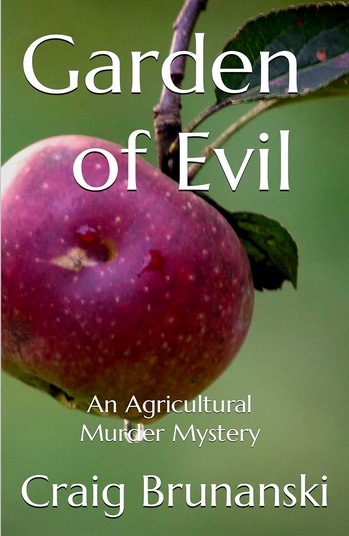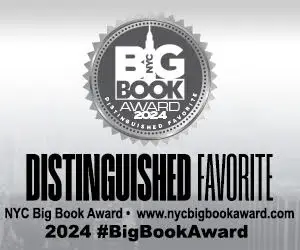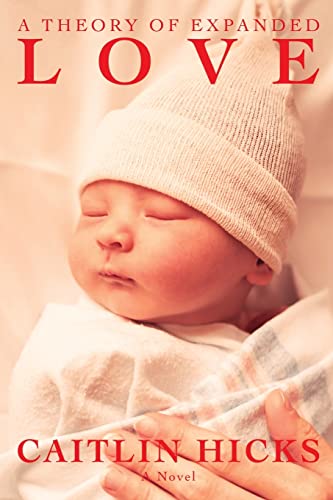An Agricultural Murder Mystery
by Craig Brunanski
Courtroom drama, small town Saskatchewan murder mystery, the David and Goliath of Big Ag versus a local anti-hero who makes his rural living at a fishing resort. The loading and unloading of enormous bushels of wheat, death by suffocation in a grain elevator, the childhood trauma of a son whose Dad was too busy to attend the important events of his life. A yellow vintage automobile at the murder site, a daughter whose wedding is planned chaos, a long-suffering wife, a lesbian couple, a leering protagonist whose sexist comments just tumble out effortlessly while he tries to solve murder after murder after murder.
It’s all there in Craig Brunanski’s Garden of Evil, An Agricultural Murder Mystery. With this colourful town of quirky characters, Brunanski uses his origins in a similar town, his experience with local weekly newspaper (his parents ran a newspaper in the small town of Wakaw, Saskatchewan where he was raised) and his personal knowledge of Big Ag issues on The Prairies-and puts it all into his fiction.
Details tumble off his stream-of-consciousness narrative, making Garden of Evil rich in unexpected but not surprising cast of characters, conundrums, and the aspirations over beer of Everyman in a rural farm-fishing town, Canada.
The Exploitation Principle that has driven the economic engines of centuries of ‘progress’ is alive and well in Garden of Evil and represented by the company Ultra Wheat. Brunanski sets up the novel with a 1976 story in Kansas: Matt hurries to get to his son’s championship football game. Loading wheat into an elevator from five-ton trucks, Matt observes the load of grain jamming in the tunnel. Hurrying to get to his son’s game, he leaps into the wheat without his safety harness to unplug the obstruction (called ‘walking down the grain’) and is sucked into the vortex. His son, Bud Zimmer, drops the ball during the game, losing the championship and cursing his father’s absence, not realizing his demise. This series of events is the black mark on the childhood of the accused villain – and explains but doesn’t quite absolve Bud Zimmer of his nefarious schemes and his sociopathic behavior. So, he’s a human being, and although you get the feeling that he’s the ‘baddie’, you have to feel some sympathy.
The same for the novel’s protagonist. The rambling narrative of Joe Burkylo takes place in the present tense, as he goes from pillar to post trying first to absolve himself of suspicion and then to solve the murder of his long-time benefactor and friend, the CEO of the BigAg company, who propped up his fishing business for years. With this character, Edgar Dunning, who disappears down the shaft of another elevator in Saskatchewan at the second beginning of the story, and the protagonist’s loyalty to his friend, the author creates a blurred line between the two sides of the BigAg / Small Farmer debate by making the murdered CEO a ‘good guy’ you might invite over for dinner. In spite of the fact that his product poisons the land, and the food supply. In spite of the fact that his company puts hard working farmers out of business for genetically modified seeds that stray on the wind.
Fast-paced, always a step ahead of the reader, Burkylo is unreliable enough as a narrator to be interesting and entertaining. You may not approve of his off-the-cuff sexism and entitled white-guy homophobia, but maybe you consider forgiving him, because these sprinkled comments come off as oddly benign and humorous, and because he genuinely cared for his wife as well as his murdered CEO. Besides, you can’t control everybody; people think what they think, believe what they believe. That’s the reality of human nature. That’s small town thinking. Let that character be himself. The haphazard nature of Joe’s thoughts as he trails around town seeking the red herring/yellow automobile and being the first to happen upon the scene of another unbelievable murder adds up to a brisk, fast-paced novel that has you guessing all the way up to the unpredictable courtroom drama that ties it all together.
As with murder mysteries, solving it is the thing here; certainly not any kind of moral high ground, or exploration of the meaning of life. The stakes are high and it looks like a show down and yet, it feels like a romp. The ending, a clever legalistic bit of acrobatics that ties everything together and makes the confusion, suspicion and accusation seem perfectly logical. Everybody, all those characters, (except for the murdered bodies strewn along the path of the narrative), ends up relieved that justice has been served. Enjoyable! The puzzle nature of it. The characters. The haphazard unfolding of the plot. The uncensored voice of Joe Burkylo, pre-feminist dinosaur.
What ultimately comforted me: the David and Goliath resonance: Burklyo’s town resumed its pre-
murder sleepiness and order-of-the-universe after Joe split open the Conspiracy Theory it took him the novel to expose.
Somehow, Small Town Saskatchewan turned ‘progress’ on its head!
Review by Caitlin Hicks



